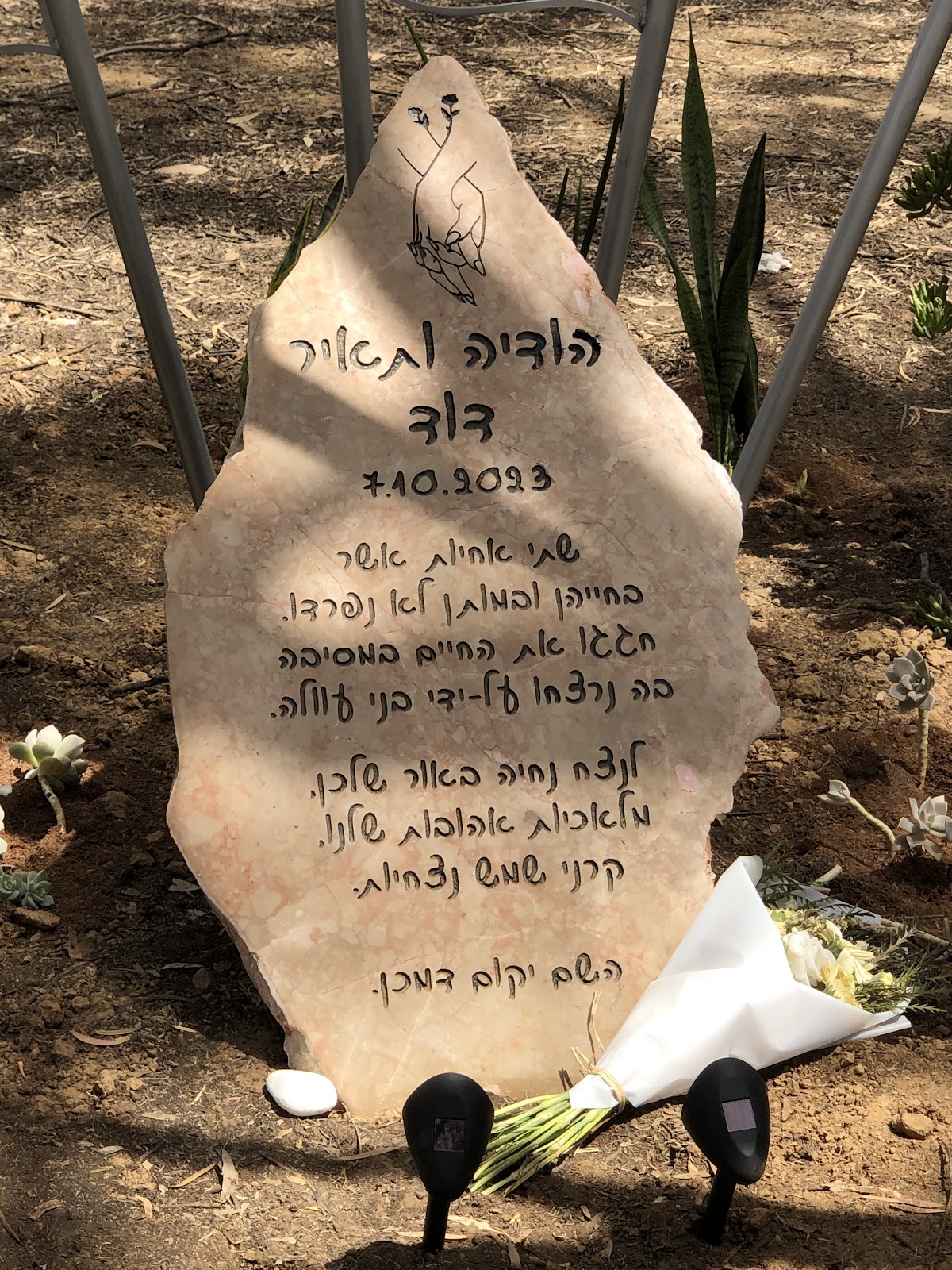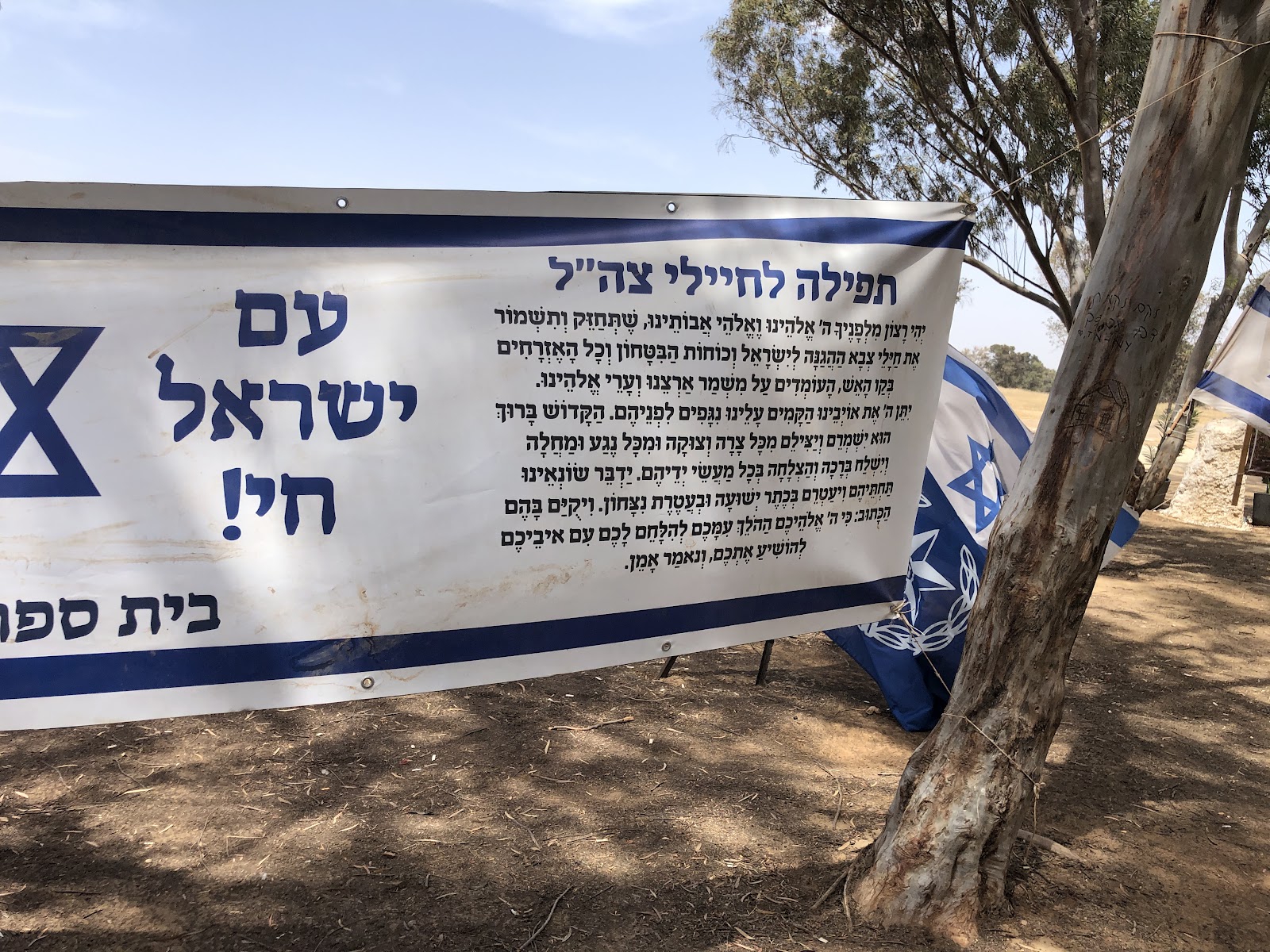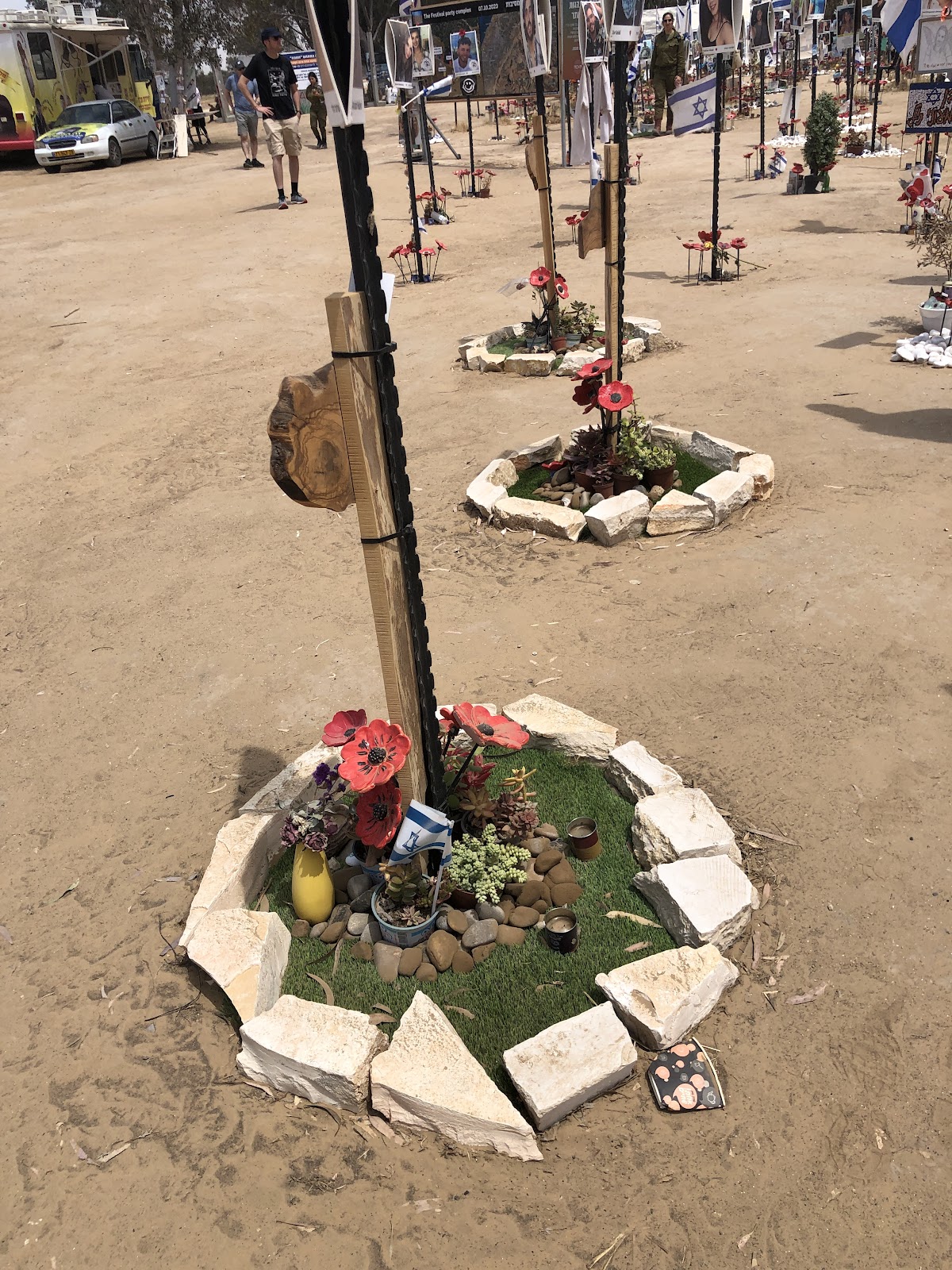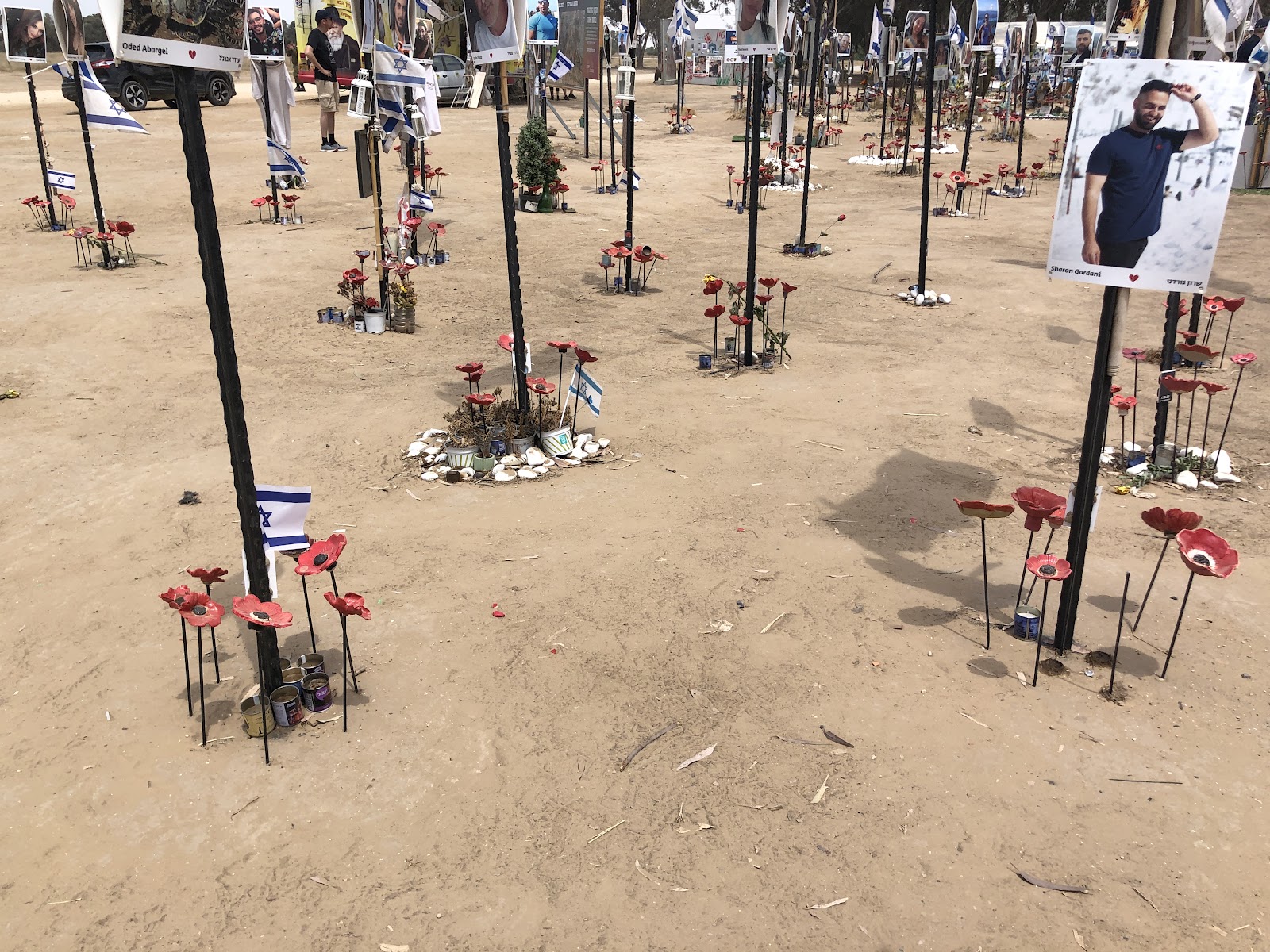On Wednesday, we headed south.
Roni Kedar, "The Other Voice"
Roni Kedar made aliyah from England and was living in a village in the northern Sinai Desert. When Begin and Sadat signed the peace treaty in the late 1970s, Sadat agreed to peace if Begin would return the Sinai to Egypt. The residents of the northern Sinai at first were upset, but then they knew what had to be done for peace.
Roni's village loved the area and wanted to find new land in Israel where they could build a similar community. They moved to Moshav Netiv HaAzara in 1982, right on the Gaza border. Life was good for the most part for about 25 years. Their village grew from 66 families to 300. With the Hamas takeover of Gaza in 2007, however, things began to go downhill, from bad to worse -- rockets, bombs, tunnels, kites, balloons, safe rooms, and more. Life was unpredictable, as they never knew when the violence would come or how long it would last.
Roni believes emphatically that peace is possible. With other volunteers, her organization reached out to Palestinians living in Gaza to work toward creating a sustainable reality for civilians on both sides. They regularly communicated through social media. The Israelis would do what they could to support the Palestinians. She tried for years to understand her Palestinian friends.
The residents of Moshav Netiv HaAzara never thought something like October 7 would happen. It wasn't human. Roni and her husband own a house in the village. All three of her adult children live with their families in the village. On October 7, one of her grandsons, on duty as a police officer, hid in an electrical closet. Another grandson hid in a closet with his mother while hearing the terrorists in the house. Those terrorists concluded that no one was home and went next door and burned down that house, killing the older couple living there. Overall, 20 people in their village died, including two relatives by marriage.
Here are some of the things Roni had to say about that day and the aftermath: "I thought about my friends on the other side of the border, but I could not voice it. My grandson who hid in the closet doesn't want to talk to me right now. We cannot go on killing each other -- it won't bring peace. But how can we say such a thing while in such pain? Still, what we are doing now doesn't help. It make no sense to say who is right and who is wrong. We cannot let the radicals take over. We must remember the people. I am proud of the projects I worked on across the border. But where are my partners now? I have lost most of them. I get an occasional WhatsApp message from them -- some still write to me though others are too angry at the Israeli government. Before October 7, they called me their 'Mother in Israel.' Some messages I have received: 'Are you all right?' 'Take care.' 'We need you.' 'We are not treating the hostages badly.' 'We are resisting and fighting for Palestine (she won't respond to that one).' 'Can you help us?'" Roni says, "I have raised money for food and sent money for them to give to Hamas to get out and to Egypt to get in."
Roni and her husband don't live in the village right now -- Israel won't let the residents back -- or won't protect them if they move back. They live near Tel Aviv in a home generously given to them by a family that is able to live elsewhere. They plan to move in another month, closer to their village, closer to their children.
Roni is lonely. She wants to go home. She knows that Jews belong in this land. And she knows that there is another people with a link to the land, too. She believes they can live together, side by side. For the sake of the generations to come, she believes that they must make it work. It can never be one people OR the other. Both belong here. She needs someone on the other side who can work with her. Right now they are too scared. But there are over 400 Israeli peace organizations, and a small number working with her through The Other Voice.
<Just then, we heard the sound of two bombs.>
Roni does acknowledge the betrayal by some Gaza Palestinians. One construction worker from Gaza was working on a house in her village. He came on October 7 with rifles, rang the bell of the house where he was working, and killed the residents. Roni doesn't want to focus on this; it is not the way to move forward. She said, "If we only blame others, we won't get anywhere. Everyone must take responsibility. We were hurt badly, but still we must move forward. There is no other choice."
<We heard the sound of three rounds of shelling.>
She went on to say, "We being victims of the Holocaust, we should understand the Palestinians because their desire is the same -- a state where they can be free. They don't have full rights in other Arab countries; and even though Israel is small, there is room for both of us."
<Two more bombs.>
Roni had much the same message as the people at Roots. We must make the personal connections and integrate each other's narrative.
<Another round of shelling.>
After October 7, she is a bit of a lone wolf in reaching out to the Palestinians.
<Three more rounds of shelling.>
She will not attend any of the demonstrations going on in the country. People on all sides are angry and ugly, acting violently and badly. She doesn't want that kind of energy around her.
<Another bomb.>
From there, we took the bus to the Gaza fence -- actually, three fences. We were shown where the wall was breached and where the terrorists flew in on drones over the wall. And we saw hopes and prayers for peace.
Nova Music Festival Site
We left Roni and did not have to drive too far to reach the site of the Nova Music Festival massacre, where 364 Israelis -- Jewish, Muslim, and Christian -- were brutally murdered, many more wounded, and some taken hostage. It has become the largest October 7 makeshift memorial. Only photos can do it justice.After walking the area for about 45 minutes, we met together for a brief memorial service, led by three of the rabbis present. I was honored to introduce and lead the Mourners' Kaddish.
The site reminded me of what lower Manhattan looked like after 9/11 -- photos of missing victims posted on walls, billboards, signs, and anywhere else a loved one could find an iota of space.
It was emotionally overwhelming.
Bedouins of Rahat
We first met with Ayesha Ziadna.
She is 30 years old and has built a center for Arab and Jewish women fostering and advancing a culture of a shared society in Rahat, a Bedouin village of 83,000, and one of several Bedouin towns and villages set up by the Israeli government in the late 1990s. They learn Hebrew and Arabic, study trades, learn to open a business, and teach each other about making and using natural medicine. Small talk focuses on food, children, and husbands who don't take out the trash.
Before October 7, they worked a lot with kids to avoid self-harm and violence. On October 7, she set up sites within Rahat, to get food and medical aid distributed to all who needed it throughout the Negev. It was Jews and Arabs, rabbis and sheiks, Knesset members, and even foreign ambassadors (U.S., Swiss, and German). She was criticized for helping Jews because some of the Arabs in Gaza are Bedouins. She says, "people are people."
In her village, one relative was killed, and four were taken hostages -- two were released and two remain in Gaza. Since October 7, her village has lost 22 additional people -- people working unprotected in agriculture, working in security, members of the IDF, or victims of missile attacks where there were no shelters.
On October 7, she felt more Israeli than ever. But then, after October 7, Ben Gavir started "gaviring," and speaking out against Arabs being in the country. Now she feels that she doesn't belong, and she is scared. 74% of Bedouins felt the same on October 7 and then they all lost those feelings because of the remarks of Ben Gavir and the ongoing killings in Gaza. Still, she believes that Jews and Arabs can live togehter and all must do something to reach that end.
She told us much more about what it was to be a woman in her society. She is expected to be married young and have many children, and to not pursue an education beyond high school. She is 30 and knows her own mind. She is unmarried, has no children, and is back in school to get an M.A. in politics and international studies. She is living the life she has chosen for herself.
About living in Israel, she said it is not the Holy Land; it is a Cursed Land. No one is calm, but the Bedouin people have hope. They are peace makers and change makers.
She showed the video, "Partners in Fate -- Arab Citizens Heroic Rescue of Jews from the Be'eri Massacre," about four Bedouin men who rescued an Israeli woman in Kibbutz Be'eri on October 7. It's only six-seven minutes. Please watch it (with a few tissues) at:
https://www.google.com/search?q=partners+in+fate+10%2F7+video&oq=partners+in+fate+10%2F7+video&gs_lcrp=EgZjaHJvbWUyBggAEEUYOTIHCAEQIRigATIHCAIQIRigAdIBCTEwOTA0ajBqN6gCALACAA&sourceid=chrome&ie=UTF-8#fpstate=ive&vld=cid:b5d68234,vid:CrXtTYm_NB8,st:0
Bedouins, she suggested, can be the bridge builders to link Arabs and Jews. They serve in the IDF and work as police, unlike other Arabs in Israel (except the Druze).
We also met with Elham Elkamalat (around age 50) and her 18 year old daughter. They are Bedouins of African descent, which placed them on the bottom of the Bedouin ranks. These Bedouins descend from Sudanis taken as slaves during the African slave trade.
They spoke about their experiences being Bedouin, Muslim, Israeli, African, tribal, and loyal to their tribe.





























Wow, Robin, that IS a lot. Those pictures were powerful, to put it mildly. I can appreciate how emotionally overwhelming this is. Thank you for sharing your experiences and for having the courage to go.
ReplyDeleteStay safe please.
I am awed and blown away. What an amazing trip to take, to hear viewpoints from so many perspectives. Thank you for educating us with your detailed documentation. Please stay safe.
ReplyDelete❤️
ReplyDelete